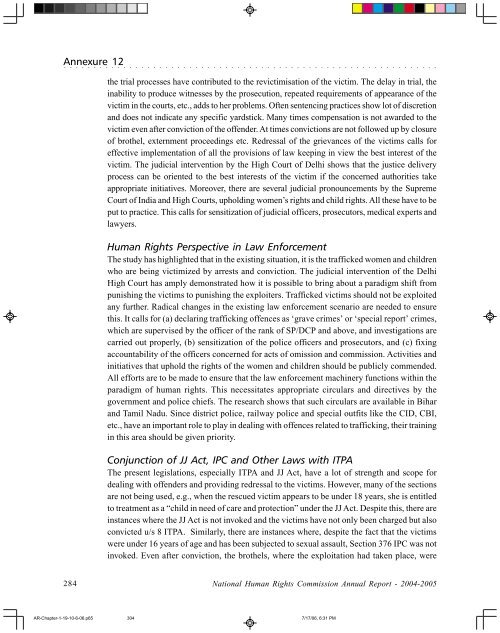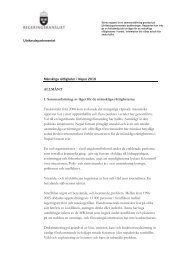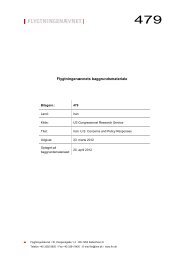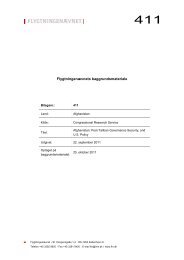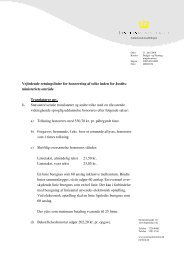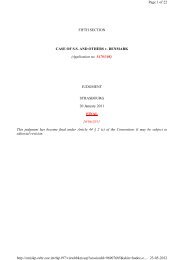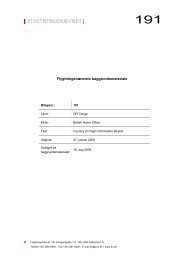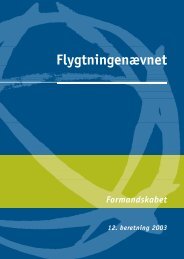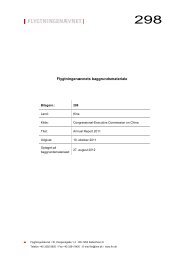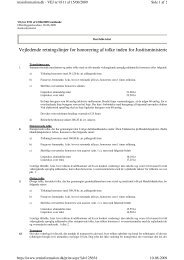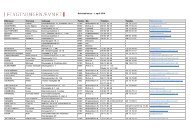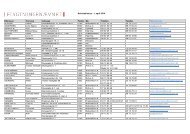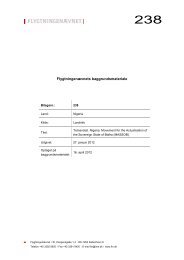Annual Report - National Human Rights Commission
Annual Report - National Human Rights Commission
Annual Report - National Human Rights Commission
You also want an ePaper? Increase the reach of your titles
YUMPU automatically turns print PDFs into web optimized ePapers that Google loves.
Annexure 12<br />
○ ○ ○ ○ ○ ○ ○ ○ ○ ○ ○ ○ ○ ○ ○ ○ ○ ○ ○ ○ ○ ○ ○ ○ ○ ○ ○ ○ ○ ○ ○ ○ ○ ○ ○ ○ ○ ○ ○ ○ ○ ○ ○ ○ ○ ○ ○ ○ ○ ○ ○ ○ ○ ○ ○ ○ ○ ○ ○ ○ ○ ○<br />
○<br />
the trial processes have contributed to the revictimisation of the victim. The delay in trial, the<br />
inability to produce witnesses by the prosecution, repeated requirements of appearance of the<br />
victim in the courts, etc., adds to her problems. Often sentencing practices show lot of discretion<br />
and does not indicate any specific yardstick. Many times compensation is not awarded to the<br />
victim even after conviction of the offender. At times convictions are not followed up by closure<br />
of brothel, externment proceedings etc. Redressal of the grievances of the victims calls for<br />
effective implementation of all the provisions of law keeping in view the best interest of the<br />
victim. The judicial intervention by the High Court of Delhi shows that the justice delivery<br />
process can be oriented to the best interests of the victim if the concerned authorities take<br />
appropriate initiatives. Moreover, there are several judicial pronouncements by the Supreme<br />
Court of India and High Courts, upholding women’s rights and child rights. All these have to be<br />
put to practice. This calls for sensitization of judicial officers, prosecutors, medical experts and<br />
lawyers.<br />
<strong>Human</strong> <strong>Rights</strong> Perspective in Law Enforcement<br />
The study has highlighted that in the existing situation, it is the trafficked women and children<br />
who are being victimized by arrests and conviction. The judicial intervention of the Delhi<br />
High Court has amply demonstrated how it is possible to bring about a paradigm shift from<br />
punishing the victims to punishing the exploiters. Trafficked victims should not be exploited<br />
any further. Radical changes in the existing law enforcement scenario are needed to ensure<br />
this. It calls for (a) declaring trafficking offences as ‘grave crimes’ or ‘special report’ crimes,<br />
which are supervised by the officer of the rank of SP/DCP and above, and investigations are<br />
carried out properly, (b) sensitization of the police officers and prosecutors, and (c) fixing<br />
accountability of the officers concerned for acts of omission and commission. Activities and<br />
initiatives that uphold the rights of the women and children should be publicly commended.<br />
All efforts are to be made to ensure that the law enforcement machinery functions within the<br />
paradigm of human rights. This necessitates appropriate circulars and directives by the<br />
government and police chiefs. The research shows that such circulars are available in Bihar<br />
and Tamil Nadu. Since district police, railway police and special outfits like the CID, CBI,<br />
etc., have an important role to play in dealing with offences related to trafficking, their training<br />
in this area should be given priority.<br />
Conjunction of JJ Act, IPC and Other Laws with ITPA<br />
The present legislations, especially ITPA and JJ Act, have a lot of strength and scope for<br />
dealing with offenders and providing redressal to the victims. However, many of the sections<br />
are not being used, e.g., when the rescued victim appears to be under 18 years, she is entitled<br />
to treatment as a “child in need of care and protection” under the JJ Act. Despite this, there are<br />
instances where the JJ Act is not invoked and the victims have not only been charged but also<br />
convicted u/s 8 ITPA. Similarly, there are instances where, despite the fact that the victims<br />
were under 16 years of age and has been subjected to sexual assault, Section 376 IPC was not<br />
invoked. Even after conviction, the brothels, where the exploitation had taken place, were<br />
284<br />
<strong>National</strong> <strong>Human</strong> <strong>Rights</strong> <strong>Commission</strong> <strong>Annual</strong> <strong>Report</strong> - 2004-2005<br />
AR-Chapter-1-19-10-6-06.p65<br />
304<br />
7/17/06, 6:31 PM


